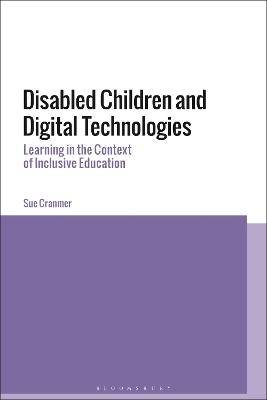
Disabled Children and Digital Technologies
Learning in the Context of Inclusive Education
Seiten
2020
Bloomsbury Academic (Verlag)
978-1-350-00205-0 (ISBN)
Bloomsbury Academic (Verlag)
978-1-350-00205-0 (ISBN)
There is much evidence to show that digital technologies greatly impact children’s lives through the use of computers, laptops and mobile devices. Children’s uses of digital technologies are, therefore, currently of huge concern to academics, teachers and parents.
Disabled Children and Digital Technologies investigates disabled children’s learning with digital technologies within the context of inclusive education. Sue Cranmer explores the potential benefits of using digital technologies to support disabled children’s learning whilst recognising that these technologies also have the potential to act as a barrier to inclusion. Cranmer provides a critical overview of how digital technologies are being used in contemporary classrooms for learning. The book includes detailed analysis of a recent study carried out with disabled children with visual impairments aged between 13 – 17 years old in mainstream secondary schools. The chapters consider the use of digital technologies in relation to access, engagement, attitudes, and skills, including safety and risk. These perspectives are complemented by interviews with teachers to explore how digital technologies can support disabled children’s learning and inclusion in mainstream settings more effectively.
Disabled Children and Digital Technologies investigates disabled children’s learning with digital technologies within the context of inclusive education. Sue Cranmer explores the potential benefits of using digital technologies to support disabled children’s learning whilst recognising that these technologies also have the potential to act as a barrier to inclusion. Cranmer provides a critical overview of how digital technologies are being used in contemporary classrooms for learning. The book includes detailed analysis of a recent study carried out with disabled children with visual impairments aged between 13 – 17 years old in mainstream secondary schools. The chapters consider the use of digital technologies in relation to access, engagement, attitudes, and skills, including safety and risk. These perspectives are complemented by interviews with teachers to explore how digital technologies can support disabled children’s learning and inclusion in mainstream settings more effectively.
Sue Cranmer is Lecturer in Digital Education and Social Justice at Lancaster University, UK. She is co-author of Primary Schools and ICT (2010).
Introduction
1. Understanding Disabled Children and Digital Technologies
2. The Importance of Social Inclusion, Inclusive Education and Digital Inclusion
3. The Potential of Digital Technologies for Learning
4. Children’s Experiences of Digital Technologies for Learning
5. Digital Skills and Competences including Online Safety and Risk
6. Talking with Teachers
Conclusion
Bibliography
Index
| Erscheinungsdatum | 15.01.2021 |
|---|---|
| Zusatzinfo | 10 bw illus |
| Verlagsort | London |
| Sprache | englisch |
| Maße | 156 x 234 mm |
| Gewicht | 440 g |
| Themenwelt | Schulbuch / Wörterbuch ► Unterrichtsvorbereitung ► Unterrichts-Handreichungen |
| Sozialwissenschaften ► Pädagogik ► Sonder-, Heil- und Förderpädagogik | |
| ISBN-10 | 1-350-00205-4 / 1350002054 |
| ISBN-13 | 978-1-350-00205-0 / 9781350002050 |
| Zustand | Neuware |
| Informationen gemäß Produktsicherheitsverordnung (GPSR) | |
| Haben Sie eine Frage zum Produkt? |
Mehr entdecken
aus dem Bereich
aus dem Bereich
elektronische Lehrmittel in den modernen Unterricht integrieren
Buch (2024)
Hanser, Carl (Verlag)
CHF 69,95
Grundwissen für Zahntechniker, Band 2
Buch | Softcover (2022)
Neuer Merkur (Verlag)
CHF 61,60
die Zusammenfassung
Buch | Softcover (2023)
Fachwirteverlag
CHF 34,70


